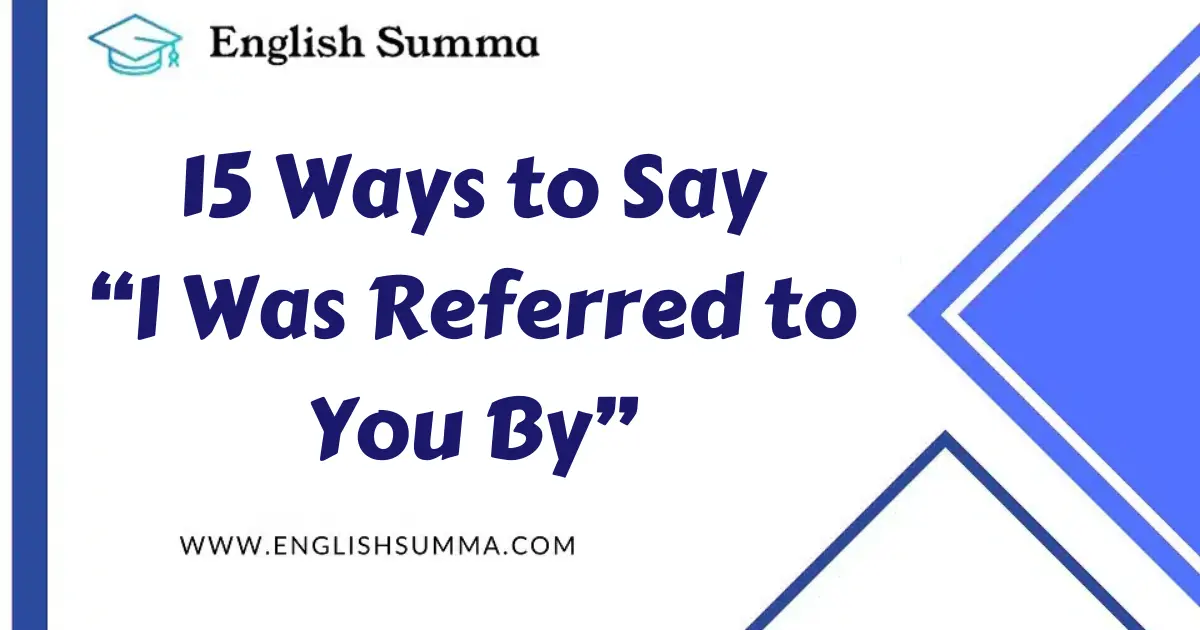In the professional landscape, making connections and leveraging referrals can be pivotal for career growth and business opportunities. Mastering the art of expressing how you came across someone’s path can make a significant impact on initial impressions.
Here are 15 ways to artfully convey that you’ve been referred, each with its unique touch.
List of Ways to Say “I Was Referred to You By”
- I come recommended by [Name]
- I was directed to you by [Name]
- [Name] suggested I reach out to you
- I was referred by [Name] to connect with you
- I come with a recommendation from [Name]
- I’m reaching out at the suggestion of [Name]
- I was pointed in your direction by [Name]
- I come as a referral from [Name]
- I was introduced to you by [Name]
- I’m here on the recommendation of [Name]
- I was referred your way by [Name]
- I come with a reference from [Name]
- I was advised to contact you by [Name]
- I’m reaching out based on [Name]’s recommendation
- I was given your contact by [Name]
1. [Name] Referred Me to You
Scenario: Email Introduction Subject: Introduction from [Name] – James Wilson
Dear Mr. Taylor,
I trust this email finds you well. My name is James Wilson, and I’m reaching out at the recommendation of [Name], who spoke highly of your expertise in marketing strategy. [Name] suggested I connect with you to discuss potential collaboration opportunities.
Looking forward to the possibility of working together.
Best regards, James Wilson
Additional Tip: Express specific qualities or projects [Name] mentioned to strengthen the connection.
2. [Name] Sent Me
Scenario: LinkedIn Message Hi Justin,
I hope this message finds you in good spirits. I’m James Wilson, and I’m excited to connect with you. [Name] sent me your way, mentioning your keen insights into project management. I’m eager to learn more about your experiences and possibly explore synergies.
Best regards, James Wilson
Additional Tip: Attach a personalized connection request on LinkedIn with a brief note.
3. I Heard About the Opening From
Scenario: Job Application Cover Letter Dear Hiring Manager,
I am writing to express my interest in the Marketing Coordinator position at your esteemed company. I learned about the opening from a colleague who spoke highly of your team’s innovative approach.
Additional Tip: Mentioning how you heard about the opening shows your proactive approach to the application.
4. I Learned About This From
Scenario: Networking Event Follow-up Email Subject: Nice Meeting You at [Event]
Dear Justin,
It was a pleasure meeting you at [Event]. I learned about your groundbreaking work in technology innovation. [Name] shared valuable insights about your initiatives, and I’m eager to continue our conversation.
Best, James Wilson
Additional Tip: Reflect on a specific topic discussed at the event to make the connection memorable.
5. [Name] Recommended You to Me
Scenario: Informal Coffee Chat Request Hi Justin,
I hope this message finds you well. I recently had a conversation with [Name], and your name came up as someone I should connect with. [Name] highly recommended you, and I would love to grab a coffee to learn more about your journey in the industry.
Best regards, James Wilson
Additional Tip: Express genuine curiosity about the person and their experiences.
6. I Was Recommended to You
Scenario: Business Partnership Inquiry Dear Mr. Taylor,
I trust this email finds you thriving. I come with a recommendation from [Name], who spoke highly of your company’s commitment to innovation. I was recommended to you as a potential partner in our upcoming project.
Looking forward to the possibility of collaboration.
Best regards, James Wilson
Additional Tip: Briefly outline the potential benefits of collaboration.
7. I Saw Your Name In
Scenario: Media Feature Acknowledgment Dear Justin,
I recently came across an article featuring your insights on sustainable business practices. I was impressed by your forward-thinking approach. Seeing your name in that context prompted me to reach out and explore potential synergies.
Best regards, James Wilson
Additional Tip: Mention specific details from the media feature to show genuine interest.
8. I Found Out About Your Company In
Scenario: Cold Email for Business Development Subject: Exploring Collaboration Opportunities
Dear Mr. Taylor,
I trust this email finds you well. I found out about your company through industry publications highlighting your innovative solutions. I am reaching out to explore potential collaboration opportunities that align with our mutual goals.
Looking forward to your response.
Best regards, James Wilson
Additional Tip: Highlight shared goals or values for a more compelling pitch.
9. [Name] Told Me About You
Scenario: Casual Networking Follow-up Hi Justin,
I hope this message finds you in good spirits. I had the pleasure of meeting [Name] at a recent event, and they spoke highly of your expertise in finance. [Name] suggested I reach out to you to exchange ideas and insights.
Looking forward to connecting soon.
Best, James Wilson
Additional Tip: Express gratitude for [Name]’s recommendation.
10. [Name] Suggested I Reach Out to You
Scenario: Consultation Request Email Dear Justin,
I hope this email finds you well. I am currently exploring opportunities for process optimization in our business, and [Name] suggested I reach out to you for your valuable insights. I would appreciate the chance to discuss how we can potentially collaborate.
Best regards, James Wilson
Additional Tip: Clearly state the purpose of reaching out to set expectations.
Don’t miss to read out Formal Ways to Say “I’m Glad to Hear That”
11. I Come with a Reference from [Name]
Scenario: Job Interview Opening Statement Good [Morning/Afternoon],
I appreciate the opportunity to interview for the [Position] role. I come with a reference from [Name], who spoke highly of the team dynamics and collaborative spirit within the company.
Additional Tip: Connect [Name]’s reference to specific qualities sought in the job description.
12. I Was Pointed in Your Direction by [Name]
Scenario: Professional Association Event Follow-up Dear Justin,
It was a pleasure attending the [Association] event where I had the opportunity to learn more about your impactful projects. I was pointed in your direction by [Name], and I’m eager to explore potential collaboration possibilities.
Best, James Wilson
Additional Tip: Mentioning a shared association adds a layer of commonality.
13. I Come as a Referral from [Name]
Scenario: Vendor Introduction Email Dear Mr. Taylor,
I trust this email finds you well. I come as a referral from [Name], who spoke highly of your company’s commitment to quality. I believe our products align with your requirements and would love the opportunity to discuss how we can meet your needs.
Best regards, James Wilson
Additional Tip: Offer a brief overview of your product or service.
14. I Was Advised to Contact You by [Name]
Scenario: Project Collaboration Inquiry Dear Justin,
I hope this message finds you in good health. I was advised to contact you by [Name], who mentioned your expertise in digital transformation. I am interested in discussing a potential collaboration on an upcoming project.
Best regards, James Wilson
Additional Tip: Clearly state the purpose and benefits of the proposed collaboration.
15. I’m Reaching Out Based on [Name]’s Recommendation
Scenario: Mentorship Request Hi Justin,
I trust this message finds you well. I am reaching out based on [Name]’s recommendation. [Name] spoke highly of your mentorship qualities, and I am eager to seek guidance as I navigate my career path.
Looking forward to the possibility of connecting with you.
Best regards, James Wilson
Additional Tip: Clearly state your goals for seeking mentorship.
Pros and Cons of Referral Approaches
Pros:
- Builds Instant Credibility: Mentioning a referral establishes trust and credibility right from the start.
- Creates a Connection: Referring to a common acquaintance creates an immediate connection, making the initial interaction more personal.
- Increases Openness: People are generally more open to communication when a mutual connection is mentioned.
Cons:
- Dependency on Referrer’s Reputation: The effectiveness of the approach depends on the reputation of the person making the referral.
- Potential Overuse: Overusing referral mentions may diminish their impact over time. It’s essential to use them judiciously.
- Risk of Miscommunication: If the referrer’s message is not conveyed accurately, it can lead to misunderstandings or misaligned expectations.

Meet Steven Smith, the driving force behind “English Summa.” Armed with a Bachelor’s Degree in Linguistics and a passion for teaching, Steven is dedicated to unraveling language intricacies for eager minds. Join him on a journey of linguistic discovery through Language Odyssey—a space where education meets inspiration, and the beauty of language unfolds.

